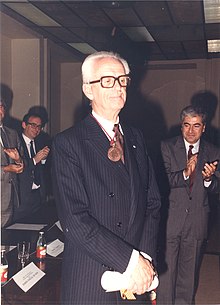
Back موريس دوفرجيه Arabic موريس دوفرجيه ARZ Maurice Duverger Catalan Maurice Duverger Czech Maurice Duverger German Maurice Duverger Esperanto Maurice Duverger Spanish Maurice Duverger Basque موریس دوورژه Persian Maurice Duverger Finnish
This article includes a list of general references, but it lacks sufficient corresponding inline citations. (February 2014) |
Maurice Duverger | |
|---|---|
 | |
| Member of the European Parliament | |
| In office 25 July 1989 – 18 July 1994 | |
| Constituency | Italy |
| Personal details | |
| Born | 6 May 1917 Angoulême, Charente, France |
| Died | 16 December 2014 (aged 97) |
| Political party | Italian Communist Party Democratic Party of the Left |
Maurice Duverger (/ˈduːvərʒeɪ/ DOO-vər-zhay; French: [mɔʁis dyvɛʁʒe]; 5 June 1917 – 16 December 2014) was a French jurist, sociologist, political scientist and politician born in Angoulême, Charente. Starting his career as a jurist at the University of Bordeaux, Duverger became more and more involved in political science and in 1948 founded one of the first faculties for political science in Bordeaux, France. An emeritus professor of the Sorbonne and member of the FNSP, he has published many books and articles in newspapers, such as Corriere della Sera, la Repubblica, El País, and especially Le Monde.
Duverger studied the evolution of political systems and the institutions that operate in diverse countries, showing a preference for empirical methods of investigation rather than philosophical reasoning. He devised a theory which became known as Duverger's law, which identifies a correlation between a first-past-the-post election system and the formation of a two-party system. While analysing the political system of France, he coined the term semi-presidential system.
A staunch communist and Soviet Union admirer, he wrote following the February 1956 speech by Soviet leader Nikita Khrushchev that Stalin had been no better and no worse than the majority of tyrants who preceded him, adding that the Russian Communist Party was a living organism whose cells were continuously rejuvenated, and that the fear of purges had had the effect of keeping the militants on edge, constantly reviving their zeal.[1] From 1989 until 1994, he was a member of the Italian Communist Party, later the Democratic Party of the Left, in the European Parliament. In 1981, he was elected a member of the Serbian Academy of Sciences and Arts. He died at the age of 97 on 16 December 2014.[2]
- ^ Raymond Aron, Mémoires, Bouquins (Robert Laffont), 2003 (1983), p. 466.
- ^ Le Gendre, Bertrand (22 December 2014). "Mort de Maurice Duverger, le 'pape' de la science politique française". Le Monde (in French).